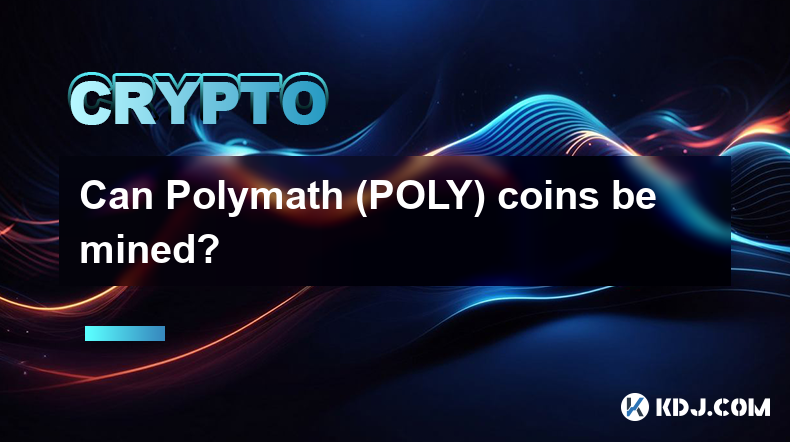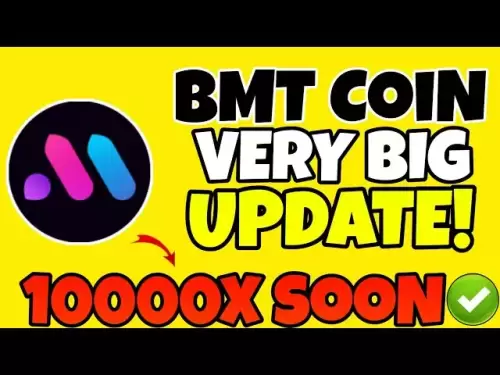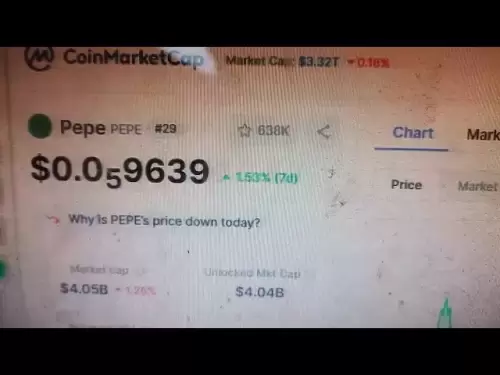-
 Bitcoin
Bitcoin $108,810.2974
0.81% -
 Ethereum
Ethereum $2,547.2589
2.01% -
 Tether USDt
Tether USDt $1.0003
0.00% -
 XRP
XRP $2.2725
2.39% -
 BNB
BNB $662.9418
1.38% -
 Solana
Solana $151.6325
3.50% -
 USDC
USDC $1.0000
-0.01% -
 TRON
TRON $0.2849
0.15% -
 Dogecoin
Dogecoin $0.1705
4.70% -
 Cardano
Cardano $0.5855
2.00% -
 Hyperliquid
Hyperliquid $39.3158
1.30% -
 Sui
Sui $2.9100
0.97% -
 Bitcoin Cash
Bitcoin Cash $495.1485
2.64% -
 Chainlink
Chainlink $13.4389
2.55% -
 UNUS SED LEO
UNUS SED LEO $9.0260
0.06% -
 Avalanche
Avalanche $18.2104
2.50% -
 Stellar
Stellar $0.2440
3.01% -
 Toncoin
Toncoin $2.9143
6.06% -
 Shiba Inu
Shiba Inu $0.0...01181
3.25% -
 Hedera
Hedera $0.1578
0.99% -
 Litecoin
Litecoin $87.8055
1.82% -
 Monero
Monero $317.3492
1.14% -
 Polkadot
Polkadot $3.3902
1.63% -
 Dai
Dai $0.9999
-0.01% -
 Ethena USDe
Ethena USDe $1.0001
-0.01% -
 Bitget Token
Bitget Token $4.4073
0.41% -
 Uniswap
Uniswap $7.3972
7.15% -
 Pepe
Pepe $0.0...01003
4.10% -
 Aave
Aave $275.5648
2.57% -
 Pi
Pi $0.4610
-0.26%
Can Polymath (POLY) coins be mined?
POLY coins, an ERC-20 token on the Ethereum blockchain, cannot be mined due to their proof-of-stake consensus mechanism, requiring acquisition through exchanges, staking, or ecosystem participation.
Dec 27, 2024 at 08:55 am

Understanding the Minability of Polymath (POLY) Coins
Key Points:
- Polymath (POLY) coins are not mineable.
- POLY is an ERC-20 token on the Ethereum blockchain.
- Mining involves the creation of new coins, which is not applicable to POLY.
- POLY can be acquired through exchanges or staking.
- Staking involves holding POLY in a wallet to support the network and earn rewards.
Delving into the Non-Minable Nature of POLY
1. Absence of Proof-of-Work Mechanism:
Unlike Bitcoin and other proof-of-work cryptocurrencies, Polymath (POLY) does not rely on mining to create new coins. In proof-of-work systems, miners solve complex mathematical equations to validate transactions and earn rewards in the form of new coins. However, POLY utilizes a different consensus mechanism known as proof-of-stake, which eliminates the need for mining.
2. POLY's Role as an ERC-20 Token:
POLY coins exist as ERC-20 tokens on the Ethereum blockchain. ERC-20 tokens represent a standard interface for creating and using tokens on the Ethereum network. They do not possess their own blockchain and are not designed to be mined. Instead, they rely on the underlying Ethereum blockchain for security and transaction processing.
3. Proof-of-Stake and POLY Staking:
In a proof-of-stake system, validators are responsible for verifying transactions and maintaining the network. Instead of mining new coins, validators stake their existing coins to participate in the consensus process. Staking POLY involves locking up your tokens in a compatible wallet to support the network's security. In return, stakers earn rewards based on the amount of POLY they stake and the duration of their participation.
Alternative Ways to Acquire POLY
1. Purchasing POLY on Exchanges:
The most common way to acquire POLY coins is through cryptocurrency exchanges. Numerous exchanges offer POLY trading pairs, allowing users to buy and sell POLY using various fiat currencies or cryptocurrencies. These exchanges typically charge trading fees, which vary depending on the platform.
2. Staking POLY for Rewards:
As mentioned earlier, staking POLY is a passive way to earn additional POLY rewards. By staking your POLY in a compatible wallet or through staking pools, you can contribute to the network's security and receive rewards in the form of POLY tokens. The rewards rate and staking requirements may vary depending on the staking platform or pool.
3. Participating in Polymath Ecosystem Activities:
Polymath actively promotes its ecosystem through partnerships, collaborations, and community initiatives. Engaging with the Polymath ecosystem by participating in events, submitting proposals, or contributing to the platform may provide opportunities to acquire POLY coins.
FAQs
Q: Why can't POLY coins be mined?
A: POLY is an ERC-20 token on the Ethereum blockchain that utilizes a proof-of-stake consensus mechanism, eliminating the need for mining.
Q: How can I get POLY if I can't mine it?
A: You can acquire POLY through cryptocurrency exchanges, staking, or participating in Polymath ecosystem activities.
Q: What is the staking process for POLY?
A: Staking POLY involves locking up your tokens in a compatible wallet or through staking pools to support the network's security. In return, you receive rewards in the form of POLY tokens.
Q: Where can I stake my POLY?
A: You can stake POLY in various compatible wallets, such as the Polymath Wallet or through staking pools provided by exchanges or other crypto platforms.
Disclaimer:info@kdj.com
The information provided is not trading advice. kdj.com does not assume any responsibility for any investments made based on the information provided in this article. Cryptocurrencies are highly volatile and it is highly recommended that you invest with caution after thorough research!
If you believe that the content used on this website infringes your copyright, please contact us immediately (info@kdj.com) and we will delete it promptly.
- Litecoin Breakout Watch: What Traders Need to Know Now
- 2025-07-06 16:50:13
- Bitcoin, Solana, Ethereum: Decoding the Latest Buzz on the Blockchain
- 2025-07-06 16:50:13
- Widnes Resident's 50p Could Be Your Ticket to Easy Street: Rare Coin Mania!
- 2025-07-06 16:55:13
- Bitcoin, Solaris Presale, and Token Rewards: What's the Buzz?
- 2025-07-06 16:55:13
- Ethereum Under Pressure: Price Drop Amid Global Uncertainties
- 2025-07-06 17:00:13
- XRP, SEC Case, and Prosperity: A New Era for XRP Holders?
- 2025-07-06 17:10:13
Related knowledge

How to customize USDT TRC20 mining fees? Flexible adjustment tutorial
Jun 13,2025 at 01:42am
Understanding USDT TRC20 Mining FeesMining fees on the TRON (TRC20) network are essential for processing transactions. Unlike Bitcoin or Ethereum, where miners directly validate transactions, TRON uses a delegated proof-of-stake (DPoS) mechanism. However, users still need to pay bandwidth and energy fees, which are collectively referred to as 'mining fe...

USDT TRC20 transaction is stuck? Solution summary
Jun 14,2025 at 11:15pm
Understanding USDT TRC20 TransactionsWhen users mention that a USDT TRC20 transaction is stuck, they typically refer to a situation where the transfer of Tether (USDT) on the TRON blockchain has not been confirmed for an extended period. This issue may arise due to various reasons such as network congestion, insufficient transaction fees, or wallet-rela...

How to cancel USDT TRC20 unconfirmed transactions? Operation guide
Jun 13,2025 at 11:01pm
Understanding USDT TRC20 Unconfirmed TransactionsWhen dealing with USDT TRC20 transactions, it’s crucial to understand what an unconfirmed transaction means. An unconfirmed transaction is one that has been broadcasted to the blockchain network but hasn’t yet been included in a block. This typically occurs due to low transaction fees or network congestio...

How to check USDT TRC20 balance? Introduction to multiple query methods
Jun 21,2025 at 02:42am
Understanding USDT TRC20 and Its ImportanceUSDT (Tether) is one of the most widely used stablecoins in the cryptocurrency market. It exists on multiple blockchain networks, including TRC20, which operates on the Tron (TRX) network. Checking your USDT TRC20 balance accurately is crucial for users who hold or transact with this asset. Whether you're sendi...

What to do if USDT TRC20 transfers are congested? Speed up trading skills
Jun 13,2025 at 09:56am
Understanding USDT TRC20 Transfer CongestionWhen transferring USDT TRC20, users may occasionally experience delays or congestion. This typically occurs due to network overload on the TRON blockchain, which hosts the TRC20 version of Tether. Unlike the ERC20 variant (which runs on Ethereum), TRC20 transactions are generally faster and cheaper, but during...

The relationship between USDT TRC20 and TRON chain: technical background analysis
Jun 12,2025 at 01:28pm
What is USDT TRC20?USDT TRC20 refers to the Tether (USDT) token issued on the TRON blockchain using the TRC-20 standard. Unlike the more commonly known ERC-20 version of USDT (which runs on Ethereum), the TRC-20 variant leverages the TRON network's infrastructure for faster and cheaper transactions. The emergence of this version came as part of Tether’s...

How to customize USDT TRC20 mining fees? Flexible adjustment tutorial
Jun 13,2025 at 01:42am
Understanding USDT TRC20 Mining FeesMining fees on the TRON (TRC20) network are essential for processing transactions. Unlike Bitcoin or Ethereum, where miners directly validate transactions, TRON uses a delegated proof-of-stake (DPoS) mechanism. However, users still need to pay bandwidth and energy fees, which are collectively referred to as 'mining fe...

USDT TRC20 transaction is stuck? Solution summary
Jun 14,2025 at 11:15pm
Understanding USDT TRC20 TransactionsWhen users mention that a USDT TRC20 transaction is stuck, they typically refer to a situation where the transfer of Tether (USDT) on the TRON blockchain has not been confirmed for an extended period. This issue may arise due to various reasons such as network congestion, insufficient transaction fees, or wallet-rela...

How to cancel USDT TRC20 unconfirmed transactions? Operation guide
Jun 13,2025 at 11:01pm
Understanding USDT TRC20 Unconfirmed TransactionsWhen dealing with USDT TRC20 transactions, it’s crucial to understand what an unconfirmed transaction means. An unconfirmed transaction is one that has been broadcasted to the blockchain network but hasn’t yet been included in a block. This typically occurs due to low transaction fees or network congestio...

How to check USDT TRC20 balance? Introduction to multiple query methods
Jun 21,2025 at 02:42am
Understanding USDT TRC20 and Its ImportanceUSDT (Tether) is one of the most widely used stablecoins in the cryptocurrency market. It exists on multiple blockchain networks, including TRC20, which operates on the Tron (TRX) network. Checking your USDT TRC20 balance accurately is crucial for users who hold or transact with this asset. Whether you're sendi...

What to do if USDT TRC20 transfers are congested? Speed up trading skills
Jun 13,2025 at 09:56am
Understanding USDT TRC20 Transfer CongestionWhen transferring USDT TRC20, users may occasionally experience delays or congestion. This typically occurs due to network overload on the TRON blockchain, which hosts the TRC20 version of Tether. Unlike the ERC20 variant (which runs on Ethereum), TRC20 transactions are generally faster and cheaper, but during...

The relationship between USDT TRC20 and TRON chain: technical background analysis
Jun 12,2025 at 01:28pm
What is USDT TRC20?USDT TRC20 refers to the Tether (USDT) token issued on the TRON blockchain using the TRC-20 standard. Unlike the more commonly known ERC-20 version of USDT (which runs on Ethereum), the TRC-20 variant leverages the TRON network's infrastructure for faster and cheaper transactions. The emergence of this version came as part of Tether’s...
See all articles

























































































